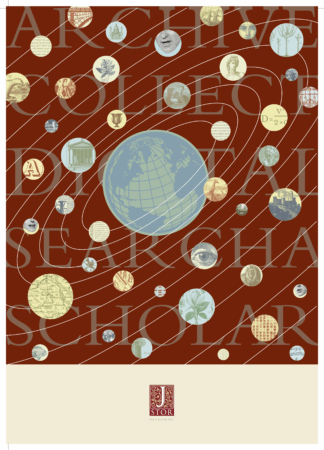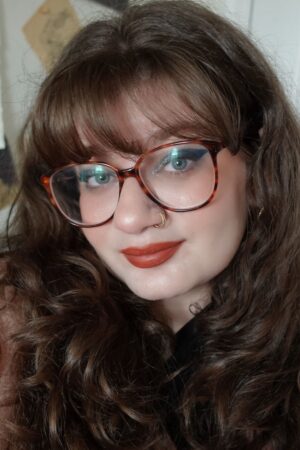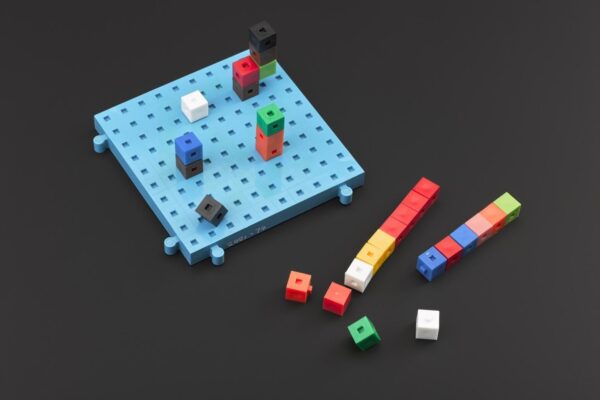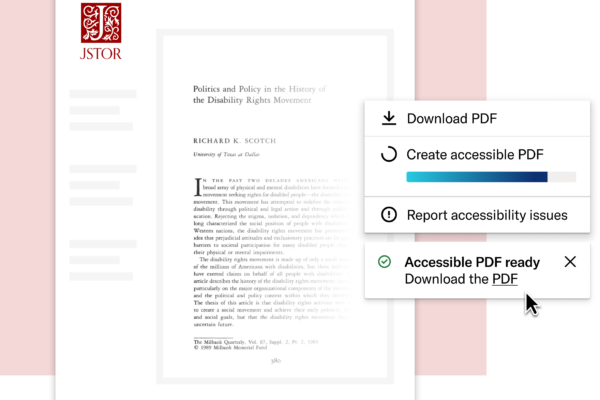This blog post is part of a series dedicated to celebrating JSTOR’s 30th anniversary. Explore the whole series.
In the last few installments of this series, we’ve reflected on JSTOR’s beginnings as an experimental initiative dedicated to digitizing journal backfiles for the sake of freeing up library shelf space. Since then, we’ve grown into a values-based, mission-driven community supporting dynamic efforts to address urgent problems in academia.
How do we hope to meet the challenges of the future? This blog post details some of the inroads we’re making in charting the path ahead, including through digital collection stewardship, faculty engagement, open scholarship initiatives, and editorial excellence. Taken together, these endeavors aim to confront the current moment and shape the future of education sustainably.

Stewarding the future of knowledge
Thirty years ago, our work began with the promise of preserving scholarly materials. Today, we’re doubling down on our founding commitment to ensure long-term access to knowledge. We envision a future in which hidden or inaccessible resources can be shared more widely.With an estimated 95% of archival materials in libraries still undigitized and unprocessed, our focus is on expanding efforts to help these collections transcend their physical boundaries. This will bring them into the hands of more researchers.
JSTOR Digital Stewardship Services–our platform for digital asset management, AI-powered collection processing, long-term preservation, and enhanced discovery–offers next-generation tools to support librarians and archivists stewarding their collections. The platform includes JSTOR Seeklight, an AI-assisted metadata generation tool that helps archival materials reach more researchers worldwide. Beyond our initial goal to digitize, this tool hopes to imbue each item with the data most useful to its discoverability.
From the very beginning, librarians and archivists have been at the heart of our mission. Their stewardship of knowledge is what makes our work possible, and we’re honored to continue this partnership as the scale and complexity of digital preservation grows. We look forward to continued collaboration with the community to develop people-centerd solutions to the ever-mounting obstacles in the field.
Deepening faculty engagement
Faculty are on the front lines of teaching and learning, and we’re grateful for all they do to foster student success. Working to support the ever-evolving needs of educators is an essential part of our next chapter. We’ve started by creating a section on our website completely devoted to sharing toolkits, webinars, and other teaching resources intended to equip instructors with what they need to meet students where they are.
JSTOR’s interactive research tool, continuously being updated with feedback from our community, is another step forward. Its features, including downloadable conversation histories and academic citation formats (APA, MLA, Chicago), can enhance research accessibility for students when integrated into faculty pedagogy. It can help guide students through research workflows and strengthen critical thinking while presenting a conscious approach to changing technological landscapes.
Additionally, Ithaka S+R is building a cohort of nearly 50 institutions dedicated to integrating AI literacy into the curriculum. The collaborative project brings together faculty, librarians, and teaching and learning centers to define institutional goals for AI literacy and develop actionable, campus-specific pathways to achieve them. By grounding this work in pedagogical expertise and shared values, the cohort aims to equip students with the critical skills needed to navigate emerging technologies thoughtfully and responsibly.
Broadening access through open scholarship
We’re reimagining what open access can look like at scale through our Path to Open pilot program, which now includes nearly 250 libraries and 50 university presses. The program provides exclusive title access to participating institutions for the first three years, after which titles are made fully open. Over time, it will publish more than 1,000 new open access monographs, many in the humanities and social sciences, which will help to ensure that diverse voices and disciplines remain findable and valued.
This community-supported approach to scholarly publishing seeks to create a more equitable and sustainable model for open access books. It has the potential to reshape how we think about scholarly communication for decades to come.
JSTOR Daily and the future of public scholarship
Since its launch over a decade ago, JSTOR Daily has offered context for current events and culture based on peer-reviewed scholarship, earning several journalism and publishing awards along the way for its editorially independent storytelling. As it creates a bridge between academic research and public understanding, it all the while elevates and encourages informed, thoughtful discourse.
Looking ahead, JSTOR Daily’s public scholarship ethos will continue to carry us through in the coming years. Its free teaching resources, in-depth feature articles, expert columns, and even award-winning podcasts, serve educators and engage the curious wherever they may be, making it a model of accessible, research-driven storytelling we’re proud to support.
A vision grounded in community
At the heart of our future work are the scholarly communities we serve. Everything we build is rooted in listening to and collaborating with librarians, archivists, faculty, students, and publishers. Their perspectives and values shape the direction of our work. As we continue to make strides with new tools and programs, the spirit of collaboration remains central.
As Kevin Guthrie, President of ITHAKA, recently wrote, “Despite the uncertainty and critical challenges… I’ve found inspiration in people’s resilience and their creativity in continuing to pursue efforts to make knowledge and education more accessible and affordable.” We’re excited to keep growing as a shared space for educators and researchers of all stripes. Thank you, as always, for co-creating a future for scholarship that is meeting the moment.
About the author

Maria Papadouris is a Content and Community Engagement Manager at ITHAKA, where she works on bringing the JSTOR community together under the common goal of championing access to knowledge (and having a fun time doing it!). A first-generation Greek American and first-generation college student, Maria studied political science and creative writing, bringing an interdisciplinary approach to issues in the humanities. She is currently pursuing graduate studies in English literature, with interests in modern literature, critical theory (particularly around ideology and power), semiotics, and philosophy.


